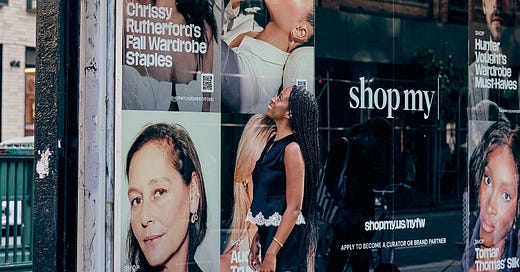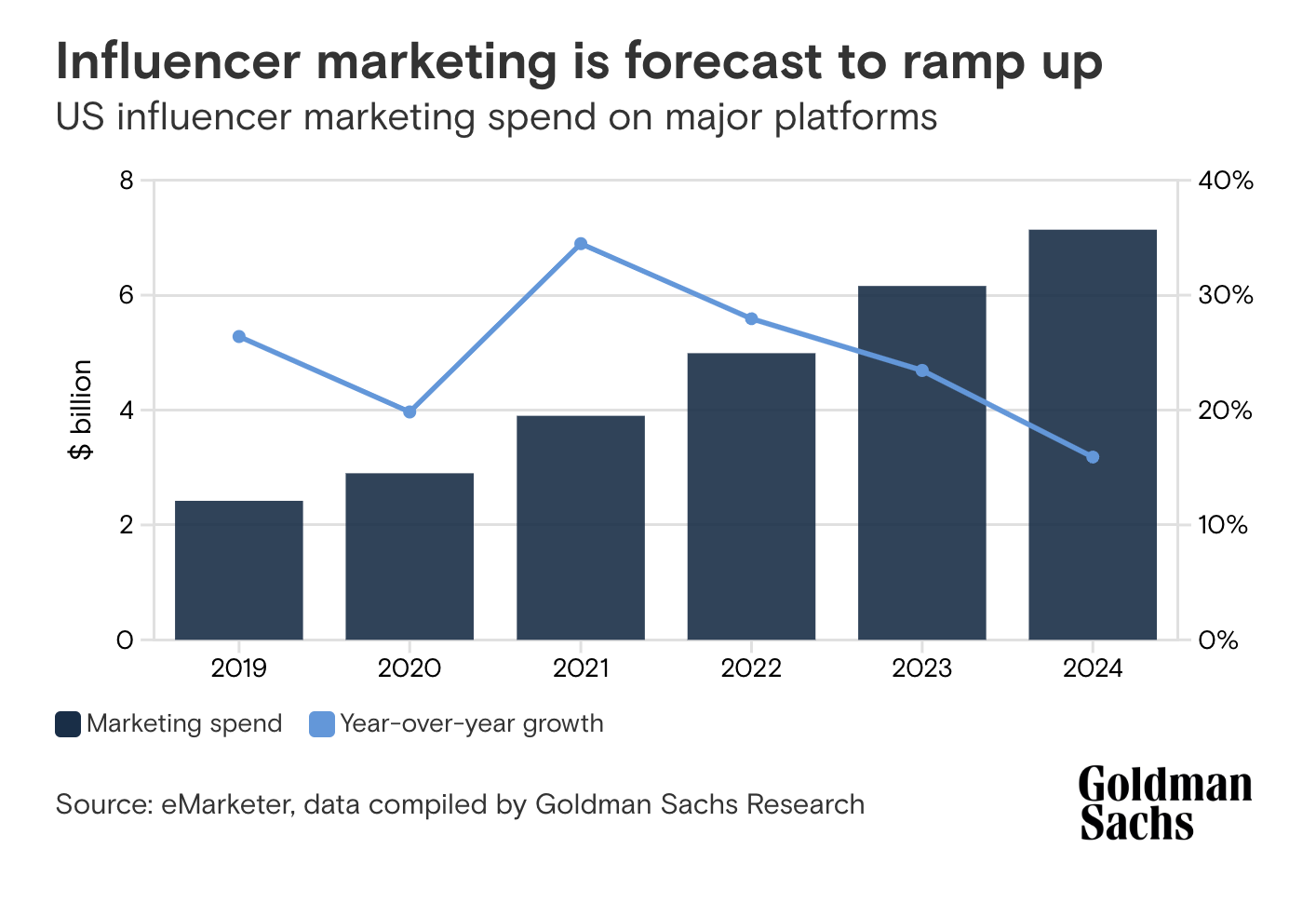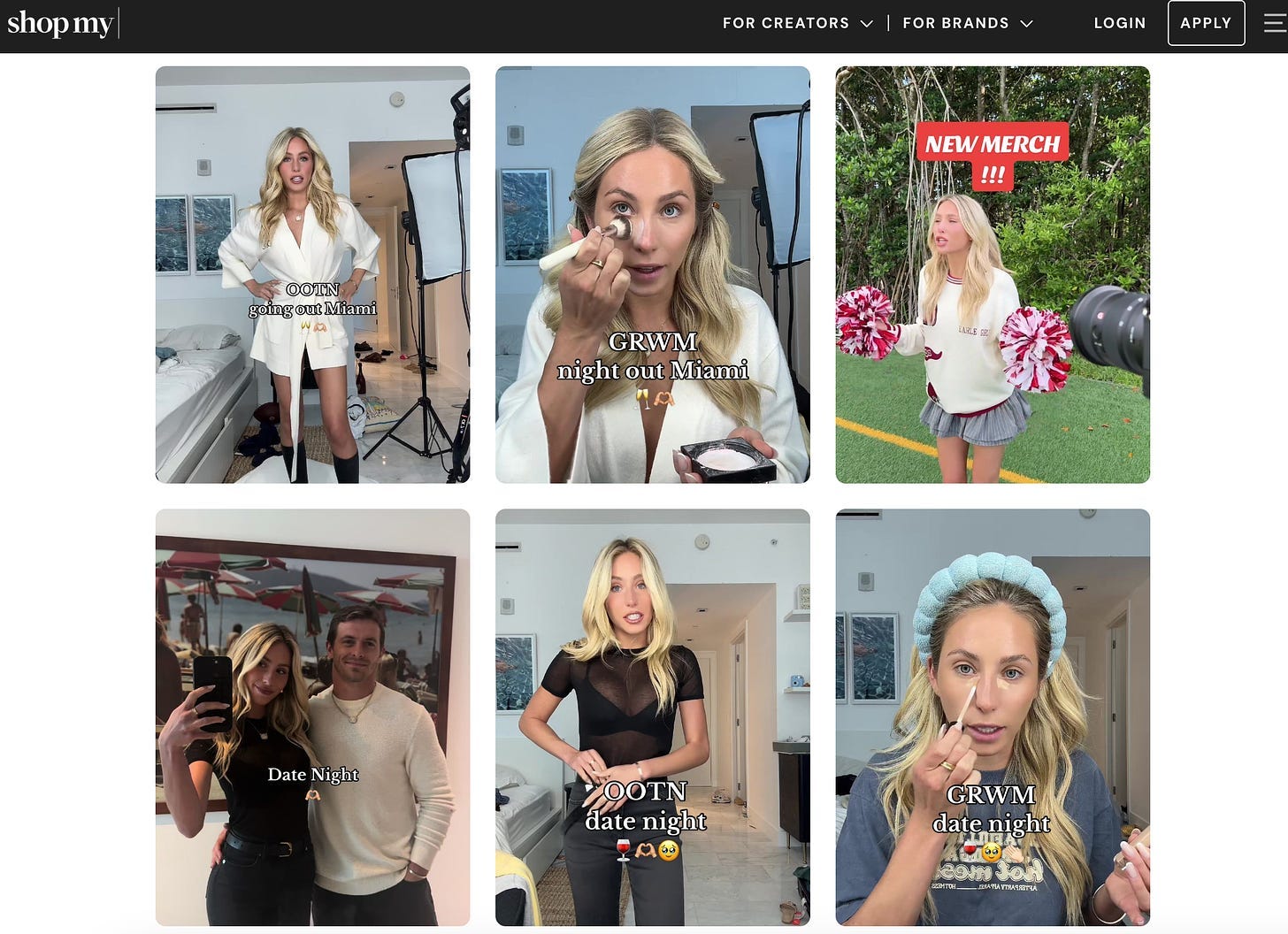this week i am writing and got my friend’s,
, thoughts on influencers and their impact on the technology + marketing landscape. the impetus behind this conversation is an article i saw that shopmy’s first creator has crossed the $1M earnings threshold on influencer links. assuming about a 15% commission for that creator, this means that their content alone has generated over $6M in sales. take a second to think about that - it is absurd and yet a massive opportunity.generating 6M in sales off of links to products seems absurd, but i think it’s explainable. influencers have become emblematic of what bollmer and guinness call the "corpocene" — a moment in capitalism in which individuals achieve the status of living, breathing, talking corporations. this comes as no surprise to us now, as influencers have become an integral category for the reproduction of the social relation that is capitalism (The Influencer Factory - A Marxist Theory of Corporate Personhood on YouTube). before i divulge any further on this topic and let my undergrad degree get the best of me, let’s dive into startups that are actually advancing the influencer economy: shopmy and ltk.
generally, there isn’t much reliable research on influencers’ tangible impact on the economy. the overall creator economy is estimated to be worth $480 billion in the next three years according to goldman sachs estimates. according to this report: “influencer marketing platforms are considered one of the most investible categories in the creator economy because they consistently help creators earn money.” naturally, they are earning a ton of money and need technology and innovation to keep up, in order to track it.
what is shopmy?
shopmy helps influencers “monetize their favorite products”. shopmy was founded in 2020 by 3 mit and harvard graduates. over 70,000 influencers, such as alix earle, set up storefronts and generated shopmy links to lead followers to their favorite products, for millions of people to see. in parallel, over 48,000 brands pay subscription to shopmy to access their data platform to analyze clicks, conversions, commission, return on ad spend, and more metrics, all on a per influencer basis. as co-founder tiffany lopinsky states “brands using shopmy have achieved an impressive ROI due to the comprehensive insights we provide about their program.”
what is LTK?
LTK has been the leading platform for creators and influencers to favorite brands to earn a commission on sales. i remember that LTK was big during COVID, before there were more sophisticated and sleek options for influencer marketing links. when clicking a LTK link, you are guided to an LTK post from the influencer on their own platform. this usually includes the links to each feature of the outfit within the post, and it requires an extra click to get to the page to purchase. you can also follow certain influencers directly in the LTK app to see all of their posts. the key differentiator between the two is that shopmy allows you to link directly to products, whereas LTK brings you to their page before you can click on the commissionable link. LTK is more consumer-facing where shopmy works more behind the scenes (you may have clicked on shop my links without even knowing).
trends to watch 👀
strachan, ceo of dorsey, predicts that in ten years time, all marketing could be influencer marketing. that shouldn’t be much of a surprise, given how much of marketing today involves influencing. as the social media landscape continues to shift and expand, it’s clear that creator marketing has become an indispensable tool for brands. while i don’t agree that all marketing could be influencer marketing, i do think it would be foolish to assume it will disappear. when something becomes a trend to a fundamental shift in consumer behavior, it is worth paying attention to. startups like shopmy and ltk are capitalizing on not only the era of e-commerce we are in but also a shift in how we like to buy things — whether it be a $30 water bottle or a $300 jacket.
as always, i am curious to hear your thoughts in the comments section below. especially from influencers who are on substack, or users of shopmy and ltk!
see you all next week! — zoya from on my mind as of late
📚 what i have been reading lately, linked here for you:
an excellent read on the influencer economy: the influencer factory
a report by goldman sachs on the creator economy
shopmy funding by techcrunch
more information on shopmy








I learn so much from your insightful articles and your way of simplifying. Kudos on the footnotes as well.
Impressive!
thank you so much for your article it was incredibly insightful. as someone who studied econ for 4 years in uni we never talked about the influencer economy focusing more international policies and all but i think influencers can and will move the needle to what is acceptable when it comes to brand deals, at least i hope so. i had never heard of the apps you're talking about tho so i have no opinions on them but thanks again, much love <3